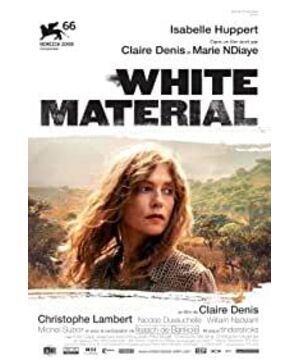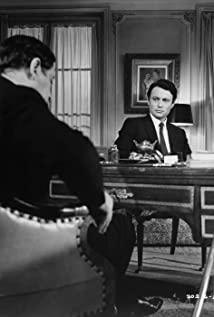Claris Denis's most recent film White Material addresses various problematic issues of the postcolonial world. Set in an unnamed African country, the film portrays a brave, independent but irrational white woman, Maria Vial, and tracks her continuous effort to protect her family's crumbling coffee plantation Despite the dual threat coming from the local government and the rebels, Maria refuses to leave the country no matter how chaotic and dangerous the environment is. As the tension of the civil war heightens, Maria eventually feels the consequence of her stubborn decision. The film delivers some important messages about post colonialism, especially through its title—White Material. “White material”, which is also mentioned by the characters in the film several times, not only implies the current tragic status of Maria Vial,but also exposes the issues of what is called the era of neocolonialism.
Despite her effort to harvest the coffee, Maria Vial is not welcomed at her home. Everyone, from the government to her ex-husband Andre, urges her to leave the country as soon as possible. Nevertheless, she still regards her coffee plantation as her priority. By hiring new workers, training them, and even priming the backup generator after the power lines were cut, Maria shows her dedication. Unfortunately, all her effort falls short, and her determination does not earn any respect for herself. Rather, throughout the film, she has been placed under gunpoint several times, which forces her into a passive position. Even though Maria insists this is where she truly belongs, the people around her still show her hatred, and treat her as “white material”. To examine the reasons for this, we need to look past the surface.When Maria claims that she “…couldn't get used to anywhere else,” one of the workers on her plantation says that the reason she does not want to leave is because “[she doesn't] want anyone taking what [she] has” (1:18:16). Thus, even though Maria regards herself as a native, she has always been in the dominant position since her family owns the whole plantation, and anyone else simply works for her. She feels the need to stay here, not because she “loves” it, but because she thinks she “owns”, or “controls” it. Now the civil war breaks out and the natives can arm themselves, Maria is descended to “white material”, enabling the natives to revenge their long colonized history. One time, the radio reporter reports through the radio: “As for the white material, the party is over…they are getting out, and they are right to run scared” (32:42). Indeed,when the natives try to reclaim what belongs to them, they regard any “white” as a “white material”, and the “white materials” have to be kicked out of the lands.
Moreover, in most circumstances, “white material” holds the meaning of'material of whites' in the film. For example, one rebel soldier claims that the gold-plated lighter they found in Vial's plantation is “white material”, meaning he thinks the lighter is something that belongs to the whites (25:03). Blond hair is another significant symbol. The camera always gives close shot to Maria's blond hair, symbolizing her difference from other people. Similarly, blond hair is also her son Manuel's main barrier to being treated as natives. Thus, he cut his own hair in order to join the rebels (1:05:31). Moreover, the'white's materials' here are not only what belongs to the whites, but also what the natives want from the whites. It is worth noticing that the natives do not simply find out the white's materials and then leave – they take them.Before insulting Manuel, the two rebel kids sneak into his house and steal stuff, including Maria's necklace in Mandrel's house (55:30); after the two kids cut Manuel's hair, one of the kids carefully smells it, like he cherishes it as a treasure (57:52); the rebels kill the people who work in the pharmacy, and then chew the pills, without knowing what exactly the pills are (1:31:11). All these details demonstrate how the natives desire the “white's material".All these details demonstrate how the natives desire the “white's material”.All these details demonstrate how the natives desire the “white's material”.
There are further underlying messages beneath this single term. First, notice that the lighter has been passed from character to character, which signifies that not just one, but most of them are influenced by the'white's material'. In addition, whenever the term is mentioned, it is in English rather than French. It exposes that, today, the former colonized areas are controlled not only by their former colonizers such as France physically, but by the whole'white's world' economically and politically. Indeed, in the era of neocolonialism, many developed countries, especially those former colonial powers, apply international economic arrangements with their former colonies in order to maintain colonial control by using practices of capitalism and globalization. As what the radio reporter says in the film:“Boxer is hiding out amidst foreigners who rips us off and use our land to grow mediocre coffee that we'd never drink” (1:20:14). To the natives, the “white material” bring'white's material' to their lands and make'white's materials.' The economy of those underdeveloped countries is highly distorted by those who influence them. They desire'white's material,' and they are influenced by'white's material,' but at the same time, they realize that they are controlled and they need to revolt at some point. Therefore, both Maria and the natives are victims, since this inequality will only bring chaos and conflict instead of peace.'The economy of those underdeveloped countries is highly distorted by those who influence them. They desire'white's material,' and they are influenced by'white's material,' but at the same time, they realize that they are controlled and they need to revolt at some point. Therefore, both Maria and the natives are victims, since this inequality will only bring chaos and conflict instead of peace.'The economy of those underdeveloped countries is highly distorted by those who influence them. They desire'white's material,' and they are influenced by'white's material,' but at the same time, they realize that they are controlled and they need to revolt at some point. Therefore, both Maria and the natives are victims, since this inequality will only bring chaos and conflict instead of peace.
View more about White Material reviews











